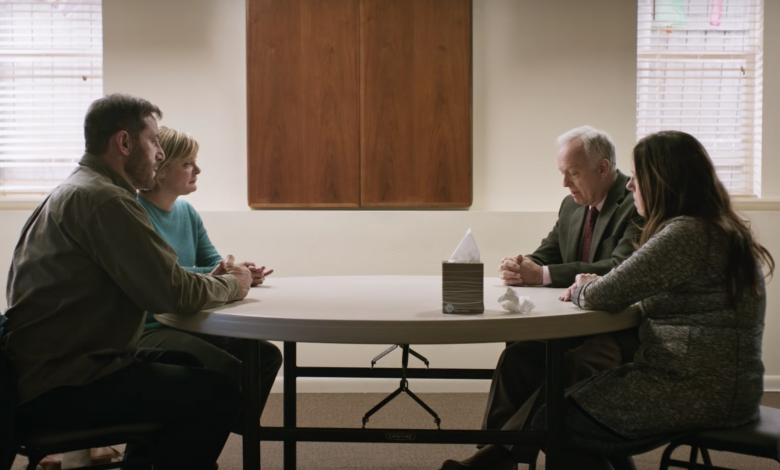Mass – Fran Kranz’s Tense, Phenomenal Debut

Karenna Umscheid ‘25 / Emertainment Monthly Staff Writer
There is something very off-putting about an empty room in a church building. The beginning of Mass introduces an itching interruption of otherwise solitude before it even introduces its characters. A piano plays solemnly, plastic is crumpled and put into a trash bin, and pieces of paper are folded and folded. The solemn uncomfortability never goes away.
As each character trickles in, we slowly begin to get context for their meeting. We first meet Jay and Gail (Jason Issacs and Martha Plimpton) in their car, apprehensively deciding to enter the church, for something they fear they may not be ready for. Richard and Linda (Reed Birney and Ann Dowd) then walk into the room and the tension heightens. Marked by a tense awkwardness, the small talk and pleasantries of the conversation quickly devolve into tears. They exchange photos and anecdotes of their children while choking back tears, Linda being the first to cry. With hostility, Gail grabs a box of tissues and slams it in front of Linda. The tension heightens, and when Gail tells Linda she wants to know about her son, Hayden, it’s suddenly revealed why.
Linda and Richard’s son Hayden was a school shooter. He killed eleven of his classmates before himself, one of the victims being Jay and Gail’s son Evan. Jay and Gail are racked with grief, with anger, and with the desire to know what could have been done to stop it. They reached out to Linda and Richard, who are also plagued with grief, but also loneliness and confusion. In her most gut-punching moment of the film, Linda wonders what she did wrong that allowed her, in her words, to raise a murderer.
Mass doesn’t pick sides. It doesn’t villainize anyone or search to make any political statement. Though the subject matter is extremely difficult to work with, Kranz’s writing is never exploitative or inappropriate. It doesn’t get deeply political or address the issue of gun violence as a whole. Instead it focuses on this complicated relationship, and explores grief creatively, and how forgiveness and progress in conversations occurs. That even conversations beginning out of necessity deemed by others, or even close to a formality, deep connection and healing can occur. Throughout nearly two hours of four people in a room screaming, sobbing, and grieving, never once is it dull or immoral.

It’s impossible to pick a standout performance because each one is magnificent. With the exception of Richard, each character has a powerful monologue, a moment where they share their strongest demon that’s emerged since the shooting. Richard remains a stoic constant, often the only character not outwardly showing emotion. The emotional moments are never oversaturated, they are always heartbreaking and honest. Each role is played to perfection.
This being Fran Kranz’s directorial debut is wildly impressive. The camerawork is highly humanistic, following the mood of each moment of each scene. It fits each aspect of the conversation, making the viewership immersive and the conversation closer and more personal. It never becomes immoral or exploitative.
Mass is a film about pain, and about healing. It tells us to ask for forgiveness, to avoid judgement and hate. The ineptitude about religion from the characters makes the setting ironic, almost funny. This film is pure humanity, the ugly in blame and yelling and pain. But also beauty, in healing, love, and forgiveness. It leans into the uncomfortability and awkwardness of the situation, producing a fruitful, honest conversation. Mass is simply exceptional.